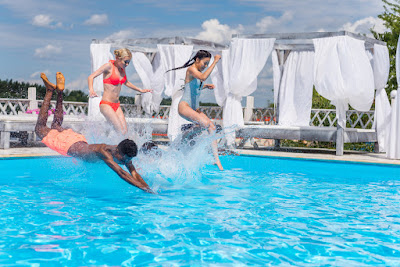What to Know Before Building Your Swimming Pool
If you've made the decision to build a swimming pool for your home, then you're probably well aware of the expenses and risks. However, if you're still in the early stages of planning, then you might not have considered all the different factors that go into planning a job as big as a pool installation in Las Vegas. Sure, you might've considered what materials you want to use or what you want it to look like, but have you taken into account the actual construction process?
We always recommend going with professional help when considering a pool installation. Qualified experts can provide not only advice, but also guidance and reassurance throughout what can be an exhausting process. There are many details to installing any large addition to a home, and people can often be blinded by their vision of the project and miss crucial installation aspects. In this blog post, we'll be discussing some of the things that experts can help homeowners resolve when building and installing a swimming pool.
Preparation
Preparation is imperative when planning your swimming pool. You need to know what you need, what you might need, and exactly what you want.
A large part of preparation when installing a swimming pool is doing your research. Questions to ask (and know the answers to) before you start construction include:
• Does your homeowner's association allow swimming pools?
• Are there any slopes in the area?
• What is the soil type?
• Where are your sewer/pipelines/etc. located?
• What's your proximity to neighbors?
• How big are you planning to go?
• What exact size would be ideal?
• How deep do you want to go?
• What's the budget?
There are many more things to take into account, but these are some of the big ones. Talking with a professional pool contractor beforehand can guarantee you'll answer all of them before starting a thing.
Pool Safety
There are a lot of things that can make your pool safer and having knowledge of which ones are worth it can help keep you and your loved ones safe.
Pool alarms are becoming more and more common as the technology becomes available and can save a life. While you should always keep your pool covered when not in use, sometimes things happen.
If a child or pet falls into a pool with no one around, it can spell disaster - pool alarms sound loudly whenever something falls into it. We know what you might be thinking, and no - you won't be woken up every night by leaves or birds landing in your pool. The alarm can be calibrated accordingly.
Another safety element to take into account is the deck material. Your pool's deck should have good grip to avoid slips. If it's made of wood, it needs a coating to prevent splinters.
Finally, pool walls can help prevent things wandering into your pool that shouldn't. These are actually required by law in some cities and states, so make sure you do your required research to see if that applies to you.
Dealing with Nature
Pool contractors can help you figure out how to help prevent leaves, branches, and other debris from infiltrating your pool. They'll recommend appropriate tools and practices. Sometimes, even wild animals like ducks and geese can be attracted to swimming pools, but you might want to call a wildlife expert about that.



Comments
Post a Comment